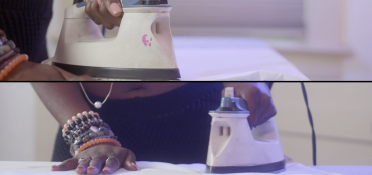In “A Hard Gold Thread” Catherine Black uses the Abcedarian to remind us that the alphabet still feels like a logic even if seen in fragments. Throughout the video a low voice whispers: “I don’t wanna talk about it don’t talk about it I don’t wanna think about itIdon’twannatalkaboutit” as flash cards, each with a letter and a corresponding image, appear like brief lighthouse beams. Above the sibilant whisper a louder vocal track describes a house precisely, as through early memories: “In the dark house the park light [B Bird] comes through the many small windows in precise beams and heats stripes of carpet” [N Nest]. The flashing of the images between moments of black space create a kind of anticipation we feel as we watch, like breath, “Here, then gone,” a recitation the body knows. Near the end of the video, the voice on the main track says “He’s home from school eating puffed wheat cereal, then candy. Don’t talk about it,” calling out to the whispers below it, drawing our attention, finally to the loud absence that’s been there all along.
In his performance of “The Blue Notebook (No. 12),” a short story by Daniil Kharms, Henry Goldkamp plays 9 different characters caught in a violent domino-effect: “A certain Panteley hit Ivan with his heel./” the story begins, “A certain Ivan hit Natalya with a wheel.” Drawing on the style of silent films, Goldkamp performs a slow brawl using props that clue us in to the nature of this fighting: An overshirt, a board, a shovel, a pitcher. If all translation involves the performance of received material, then we might experience Goldkamp’s video as a visual translation of Matvei Yankelevich’s English translation of Kharms’s Russian text. As a performer, Goldkamp succeeds at one of the translator’s most difficult jobs by capturing the text’s quiet humor. How does a person “hit” another man “with his heel”? Goldkamp knows and can show us. Under soviet rule Daniil Kharms was imprisoned twice for making absurdist art that rejected narrative as a form of meaning. Kharms’s writing often moved through a kind of “comic language-momentum” that stopped just short of a climax. Outside of prison, Kharms once performed a reading standing atop an armoire, dressed like Sherlock Holmes. In this latest translation of “The Blue Notebook (No.12),” Goldkamp reveals in its momentum the unsatisfying conclusion to a whodunit (no one! everyone!) that feels precisely like Kharms: a reveling the kind of unruly, personal violence so unlike state-sanctioned oppression.
Ariana Thomas’s “Ironing Pillowcases” is a video thinking about how gestures catalyze words, and so too the reverse. “I need your trust in me to be seamless and without creases so I’m cleanin,” writes the speaker as she slips a bible under the box spring and sprinkles water between the mattress and the fitted sheet. As a figure moves methodically through a house, folding and marking intentions, the video invites the viewer to consider how physical acts of care influence the bodies of those who perform them as much as the bodies of those who receive unknowingly. As a document, perhaps this video also re-enacts the incantations paired with “hand-washin’, wringin’, clothesline dryin” when it's played. “Ironing Pillowcases” is a piece that multiplies domestic ritual as a mode of continuous un-manifesting, a type of interior weather that keeps out a rising storm.
“I am a body ripping, tripping through space,” opens Francesca Ekwuyasi’s video “Lacuna.” As the camera pans across the city of Lagos, gray sidewalks and bright roofs, car horns and creaking metal, lines from recorded interviews play and reiterate via subtitles. “I knew when I was like seven or eight that I was not straight,” says one voice, “I still like the Catholic way of doing things and prayer and ritual,” says another. Ekwuyasi’s project combines documentary strategies by presenting the orange egg crates, yellow taxis, and blue plastic bags at the city’s street level while disembodied voices consider the role of queerness in their lives. In the distance, a rainbow hangs over a forest as the narrator returns to insist “we’re merely bodies tearing through bodies.” Near the end of the video, the narrative voice continues via audio as the interviews progress in subtitles, quietly. Rather than filling in the gap it describes, “Lacuna”’s hovering characters get to question the flatness of a city seen through a wide-panning camera.



